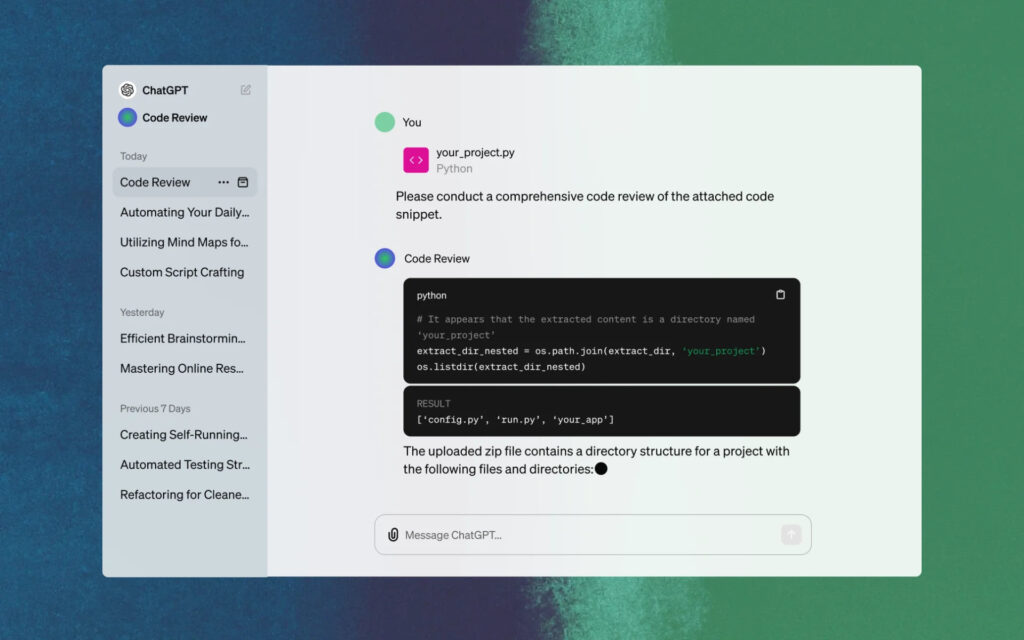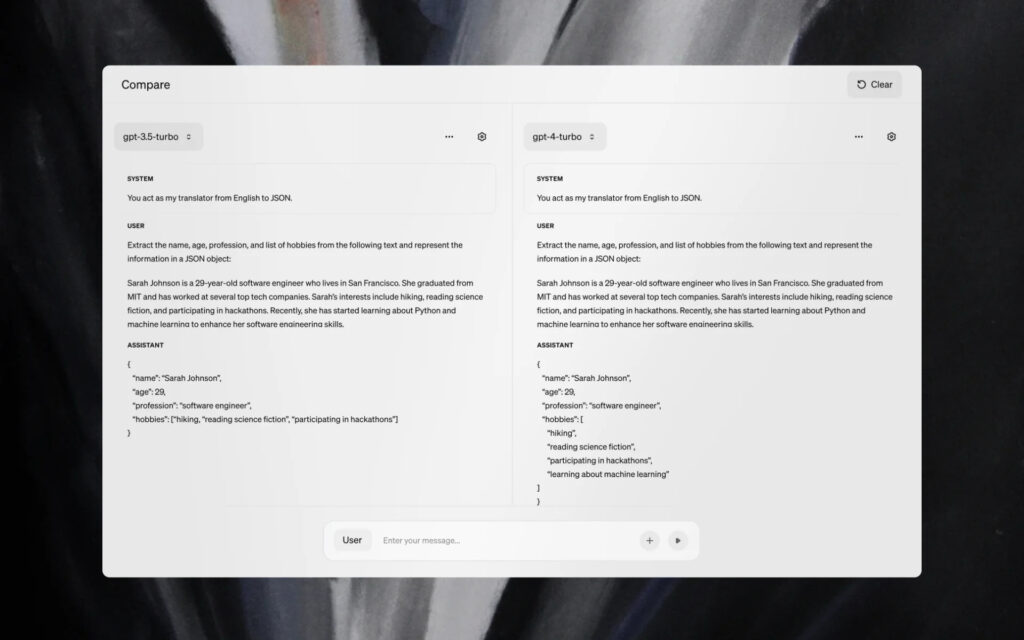Découvrez la dernière version de ChatGPT : GPT-4 Turbo ! L’IA la plus avancée d’OpenAI présente de nombreuses optimisations qui vont booster la productivité des professionnels et entreprises.
Dans cet article, explorez les améliorations phares de GPT-4 Turbo, mais aussi comment accéder à cette version, ainsi qu’à ChatGPT 3.5 et ChatGPT 4.
Qu’est-ce que GPT-4 Turbo ?
Disponible pour les abonnés, GPT-4 Turbo est la dernière version de ChatGPT. Cette mise à jour d’OpenAI surpasse désormais des modèles concurrents comme Claude 3 Opus et Gemini Pro 1.5 grâce à des performances améliorées significatives, notamment en mathématiques, raisonnement logique et codage.
Parmi les optimisations notables, nous pouvons citer :
Des performances améliorées pour booster votre productivité
GPT-4 Turbo établit de nouveaux records avec des scores exceptionnels sur divers benchmarks : 72,2% sur MATH*, contre 63,2% pour Claude 3 Opus et 58,5% pour Gemini Pro 1.5. De plus, il obtient 86,5% sur le test MMLU** et 87,6% sur HumanEval***.
Autrement dit, la dernière version de ChatGPT dispose d’une capacité à résoudre des problèmes complexes plus rapidement et avec une précision accrue. Le chatbot devient un assistant capable de gérer des calculs sophistiqués, de fournir des analyses détaillées et de résoudre des défis logiques en un temps record. En tant qu’entrepreneur, c’est l’occasion d’optimiser vos décisions stratégiques et opérationnelles.
*Le benchmark MATH évalue la capacité d’un modèle à résoudre des problèmes de mathématiques de différents niveaux de difficulté.
**Le test MMLU (Massive Multitask Language Understanding) mesure la compréhension multitâche du langage, en évaluant la performance sur une grande variété de sujets académiques et professionnels.
***HumanEval évalue la capacité d’un modèle à écrire du code fonctionnel et correct à partir de descriptions en langage naturel.
Une communication optimisée pour des échanges plus fluides
GPT-4 Turbo se dote d’un langage plus naturel et conversationnel, avec des réponses directes, moins éloquentes.
Par ailleurs, grâce à une fenêtre contextuelle élargie à 128 000 jetons, ce modèle peut analyser l’équivalent de plus de 300 pages de texte en une seule fois. En d’autres mots, la nouvelle version d’OpenIA comprend davantage les documents longs et complexes pour rédiger des analyses plus précises.
Fini les échanges interminables pour expliquer un concept : GPT-4 Turbo saisit rapidement le contexte !
Un meilleur entraînement pour un coût amoindri
Formé sur des données récentes jusqu’à décembre 2023, GPT-4 Turbo aussi performant qu’économique. Il coûte trois fois moins en jetons d’entrée et deux fois moins en jetons de sortie par rapport à GPT-4.
Pour les entreprises, cela se traduit par des économies substantielles sur les coûts d’utilisation de l’IA.
De nouvelles capacités de vision pour une polyvalence accrue
La fonctionnalité “GPT-4 Turbo with Vision” permet au modèle de traiter et d’analyser des images. Une optimisation qui ouvre un large éventail de nouvelles applications pour les professionnels. Si vous avez besoin d’analyser des designs, de vérifier des documents visuels ou de développer des applications innovantes basées sur la reconnaissance d’images, GPT-4 Turbo ouvre des possibilités infinies.
Accès et utilisation des différentes versions de ChatGPT
Entre ChatGPT 3.4, GPT 4 et la dernière version GPT-4 Turbo, comment choisir ? Quelles sont les différences fondamentales entre ces formules ?
ChatGPT 3.5, l’IA gratuite
Dialoguer avec l’intelligence artificielle d’OpenAI, sans dépenser un centime, c’est possible avec ChatGPT 3.5.
Pour y accéder, visitez simplement le site web du développeur, créez un compte ou connectez-vous, puis sélectionnez GPT-3.5 pour expérimenter cette technologie fascinante.
Cette version gratuite est parfaitement adaptée pour des tâches simples à modérées, comme la rédaction d’un brouillon de texte, les réponses aux questions courantes et les interactions de base.
ChatGPT-4, l’offre « Plus »

La montée en gamme vers GPT-4 ouvre davantage de fonctionnalités, ainsi qu’une amélioration importante des réponses reçues. Cette version, accessible via un abonnement payant à 20$ par mois ou via API (30$ pour 1M tokens), dispose d’un meilleur raisonnement, d’une compréhension accrue et d’une logique plus puissante.
Elle donne aussi accès à la recherche sur le web, à DALL-E, le générateur d’images d’OpenAI et à GPT-4o, une version boostée de ChatGPT 4, proche de Turbo.
Accès à la dernière version de ChatGPT : GPT-4 Turbo

Pour les utilisateurs ayant des connaissances en programmation, GPT-4 Turbo offre le summum de la personnalisation et de la performance. Disponible uniquement en version API, ce modèle révolutionnaire permet d’intégrer des capacités d’IA avancées directement dans vos applications.
Pour commencer, inscrivez-vous sur OpenAI et obtenez vos clés API indispensables pour l’intégration de GPT-4 Turbo. Une fois inscrit, consultez la documentation détaillée fournie par OpenAI. Celle-ci vous guide étape par étape pour configurer et exécuter votre premier script pour une mise en route fluide et rapide.
GPT-4 Turbo est particulièrement adapté aux professionnels cherchant à maximiser les capacités de l’IA dans leurs projets ou produits. Avec une fenêtre contextuelle élargie à 128 000 jetons, et des coûts réduits par rapport à ses prédécesseurs, cette mise à jour est particulièrement puissante, tout en restant accessible.
Pour accéder à cette dernière version de ChatGPT, comptez 10 $ pour 1 million de jetons d’entrée et 30$ pour 1 million de jetons de sortie. Un prix abordable pour utiliser une IA qui se distingue avec des performances de raisonnement supérieures, combinées à ses nouvelles capacités de vision.
Notre dernier conseil pour bien utiliser ChatGPT 4 Turbo
Cette dernière version avancée de ChatGPT dispose de capacités inégalées en matière de traitement de l’information et de résolution de problèmes complexes. Nous vous encourageons vivement à explorer ces outils pour améliorer votre efficacité et votre compétitivité.
Si vous avez besoin d’assistance pour intégrer l’API de ChatGPT-4 Turbo dans vos projets web, postez votre annonce gratuitement sur Codeur.com !









